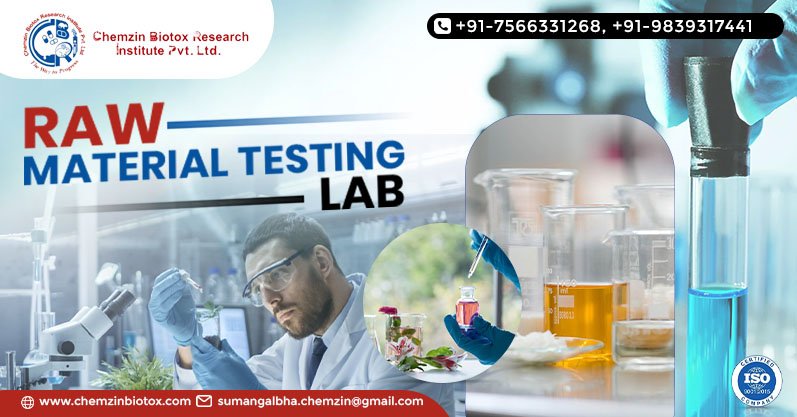India’s manufacturing sector has increased many times in the last few years. The annual growth rate will be 4.5%. Whether pharma or packaged food, all products are raw material dependent. The final product’s functionality and quality are directly impacted by unsafe raw materials. The Raw material testing labs comes at the end of this chain. As per the statistics released by the Bureau of Indian Standards (BIS), industries that do raw material testing regularly reduce product rejection by 45%. Especially in sensitive industries such as raw material testing of pharmaceuticals, this verification can be a case of life and death.
Chemzin Biotox Research Institute Pvt. Ltd., which is a renowned name in raw material testing in pharmaceuticals. Through this blog, let us know about the process of how these labs make our consumer products safe to consume. To learn more about our testing services, give us a call at +91-7566331268, +91-9839317441 and send an email to sumangalbha.chemzin@gmail.com.
Why is Testing Raw Materials So Important in India?
India’s massive consumer base equates to millions being made daily. Be it medicines, processed foods, construction materials, or cosmetics. It all depends on quality raw materials. The product may cost you your money and can also pose a health risk in case of bad raw materials.
In fact, through research, it has been proven that 40% of the product recalls in India are a result of low-quality raw materials. That’s why raw material testing before manufacturing is very important. For example, in Raw material testing in pharmaceuticals, impurities, even in small quantities have the potential to generate toxic side effects. With these advancements, laboratories help industry avoid defective products and litigation.
Additionally, these labs test for physical attributes such as moisture content, particle size, color, and texture. Any deviation from the same might be a sign of contamination or a quality issue. For example, high moisture content in raw grains can cause fungus, which can be harmful to the consumers if used without testing.
What Are the Key Testing Methods Used by Raw Material Labs?
Physical and Visual Checks
The first testing is usually sight testing, which is basic but critical. Raw material testing laboratories check for color, texture, smell, and appearance. These are determined by physical testing density, water content, hardness, etc. Hence, these are the tests that firms use to detect faulty batches in time.
Chemical Composition Testing
Chemical tests are next. Here, laboratories measure quantitatively the concentration of minerals, metals, active ingredients, or harmful chemicals present in raw material. During the testing of raw materials for medicines, the procedure is very stringent. Even an insignificant change from the standard value will prove hazardous to health.
Microbial Safety Testing
Microbiological analysis confirms that raw materials lack contaminated pathogenic bacteria, fungi, and viruses. This is therefore particularly true in the food, pharmaceutical, and cosmetic sectors. Microbiological contamination is approximately 30% of food-related offences.
How Does a Raw Material Testing Labs Safeguard Your Products?
The role of raw material testing labs is not only to test. Hence, they act as a barrier to hazardous materials and safe products. Effective testing prevents manufacturers from taking massive recalls, lose money, and getting into litigation.
For instance, a medicine company employing untested chemicals can produce harmful medicines. However, they get certified and scientifically tested products when they work with reputable labs like Chemzin Biotox Research Institute Pvt. Ltd. Additionally, this increases consumer trust and the genuineness of the product.
Testing is an affordable business as well. Testing raw materials has reduced the production loss rate by 38%, studies have shown. Saving time and money is another reward of the early warning. This does enhance production efficiency, but it also makes up for it regarding the brand getting complete listening by customers.
Furthermore, raw material testing is required for the majority of the certificates. Proper documents and lab reports are also needed by the FSSAI and the DCGI before such products are approved.
Contact Us
Company Name: Chemzin Biotox
Address: 1st Floor, Plot No-94,
Ind.Area Phase 1, Jharmajri EPIP,
Solan, Himachal Pradesh, 174103
Phone No.: +91-7566331268, +91-9839317441
Email Id: sumangalbha.chemzin@gmail.com
Conclusion
To summarize, the raw material testing labs performs an important function regarding the safety, reliability, and commercialization of products. Periodic testing protects industries from product failures, health threats, and litigation. Moreover, Chemzin Biotox Research Institute Pvt. Ltd. provide accurate, reliable testing services that protect consumers and businesses.
Frequently Asked Questions
Q.1 What is the main reason for testing raw materials?
Ans. Testing of raw materials guarantees the safety, quality, and purity of the materials used to make products. It stops you from putting the wrong product out there. Moreover, it keeps you in compliance, and it keeps the public safe from a health risk.
Q.2 Why is testing raw materials crucial in India?
Ans. Given that India has a substantial manufacturing sector, product safety is a top priority. Thus, testing prevents product recalls, legal problems, and health risks and establishes industry takes.
Q.3 How does the raw material testing labs check for contamination?
Ans. Laboratories conduct physical, chemical, and microbiological analysis. These are used to test moisture, texture, chemical composition, and microbial composition to gauge the quality and safety of the material.

